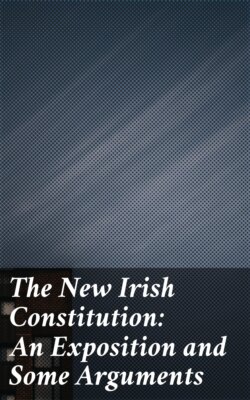Читать книгу The New Irish Constitution: An Exposition and Some Arguments - Various - Страница 14
На сайте Литреса книга снята с продажи.
The Further Extension of Home Rule
ОглавлениеTable of Contents
The anomaly, however, remains. How is it to be met? Obviously it is but a temporary difficulty if, as the Prime Minister has suggested in his speech on the first reading, the Bill is to be regarded as but the first step in a general devolution of the legislative powers of the Imperial Parliament. But everything depends on how far that devolution is to be carried. The Prime Minister's reference to a change in the Standing Orders suggests a further development of the Committee system already in operation in the case of the Scottish Standing Committee by which the House has delegated a certain degree of provincial autonomy to a group of members. It would be possible to extend [pg 045] this to the creation of a Standing Committee for England and Wales. Under such a system Irish Members would be excluded from the Committee stages of legislation which was neither Irish nor Imperial. But there remains the Report stage, which is always apt to resolve itself into a Second Committee stage58 in which the whole House participates. Moreover, an impassable limit is set to this process of domestic devolution by the necessity that the Government of to-day should command a majority in each of these Committees. A Liberal Ministry would probably find itself in a minority in an English Standing Committee, and a Unionist Ministry would, with equal probability, find itself in a minority in a Scottish Committee. Committees have become not so much a sphere for the legislative initiative of the private member as a new outlet for Government business. Contentious bills introduced or adopted by the Government are referred to them, and the moment this is the case the Minister in charge who is confronted in Committee with amendments which he does not care to accept may invite the whole House on the Report stage of the Bill to disallow them. The House itself, jealous of any surrender of its prerogatives, is only too apt to turn the Report stage into a second Committee stage. The responsibility of a Government department for the preparation and execution of legislation is to-day so indispensable that effective legislative devolution is almost impossible without devolution of the executive also. A Committee to which the Minister in charge of the Bill is not responsible is not in a position to exercise effectual control over legislation. Indeed it seems impossible to contemplate a devolution of legislative power without a [pg 046] corresponding devolution of executive power. So long as we have but one Executive in the House of Commons it is impossible to have two or three legislatures within the walls of that House. Moreover, it is just as imperative to restore the diminishing control of members of Parliament over administration as it is to re-establish their authority in legislation. There is a growing and regrettable tendency to confer upon Government departments both legislative and judicial powers—powers to make statutory orders and to interpret them, which is depriving our constitution of what has hitherto been regarded by foreign students as one of its most distinctive features—the subordination of the executive to the legislature and to the courts. The distinction between Gesetz und Verordnung,59 between statute and order, is fast disappearing in the enormous volume of statutory orders. Powers to make rules under particular statutes are entrusted to Scotch, Irish, and English Departments which have the effect of diminishing the control of the House of Commons without transferring it to any representative substitute. The great increase of grants-in-aid for administrative purposes has also given the departments a power of indirect legislation by the latitude they enjoy in the distribution of them such as is further calculated to diminish the control of the House of Commons over questions of Irish and Scotch policy. Rarely do any marked departures by the departments come under the review of the House of Commons; the claims of the Government over the time-table of the House, fortified by certain rulings of the Speaker,60 [pg 047] may and frequently do preclude any examination of them. In the words of a famous resolution, one may say “the power of the Executive has increased, is increasing, and ought to be diminished.”
But it is no remedy for this state of things to provide for administrative devolution alone. To devolve the authority which a great Department of State, such as the Board of Agriculture, exercises over the whole of Great Britain by the simple process of assigning its Scotch business to the Secretary for Scotland, does not increase the control of Scottish members over the executive. This process of administrative devolution, which is always going on, is not accompanied by any measure of legislative devolution; the Secretary for Scotland is not thereby brought under the control of the Scotch Standing Committee.
To create a new Scottish or Irish Department does not increase Parliamentary control over Scottish or Irish administration; rather it diminishes it. The heads of a Scottish Education Office, Local Government Board, and Department of Agriculture have been made responsible not to the House of Commons but to the Secretary for Scotland. Like the Chief Secretary for Ireland, he is a Prime Minister without a Cabinet and without a Legislature, and his policy is determined primarily not by Scottish or Irish opinion, but by the alien issues of imperial politics. Obviously there will never be any remedy for these anomalies until we have a Legislature with an executive responsible to it.
